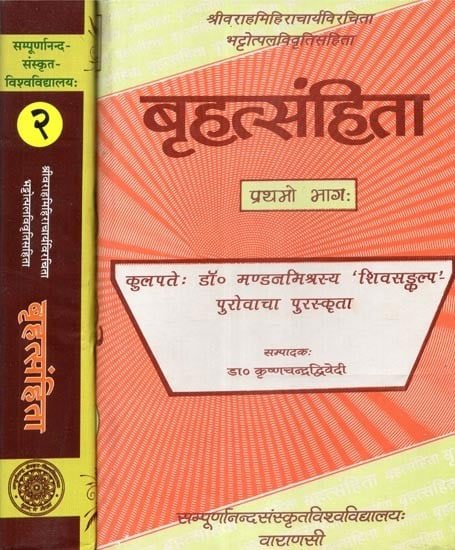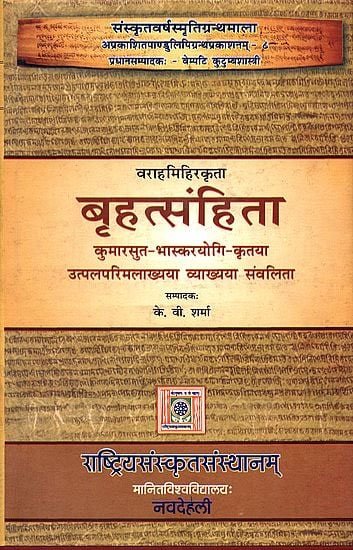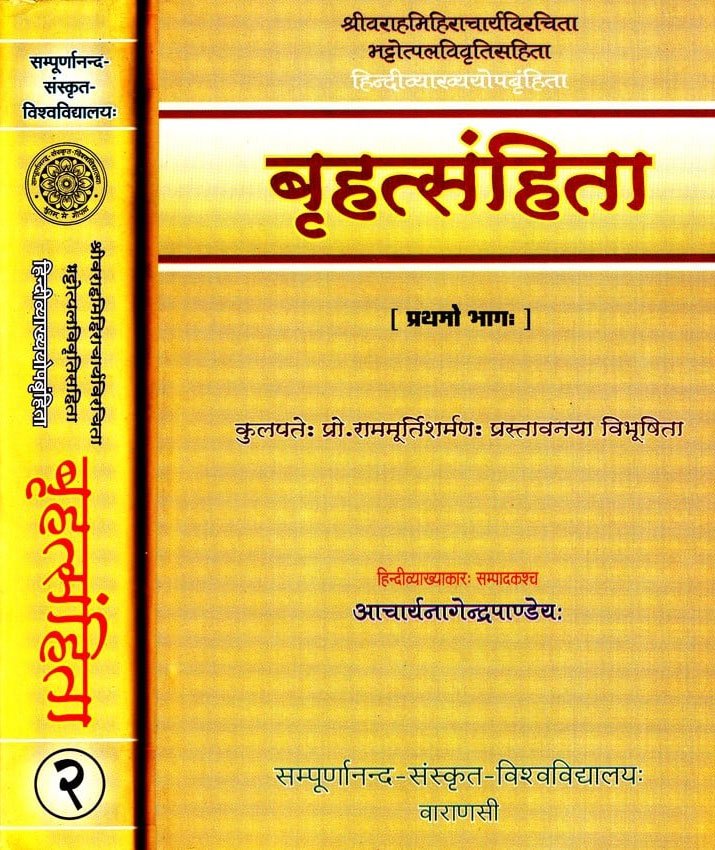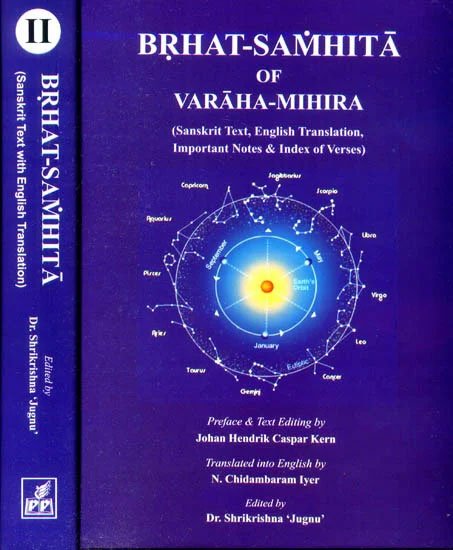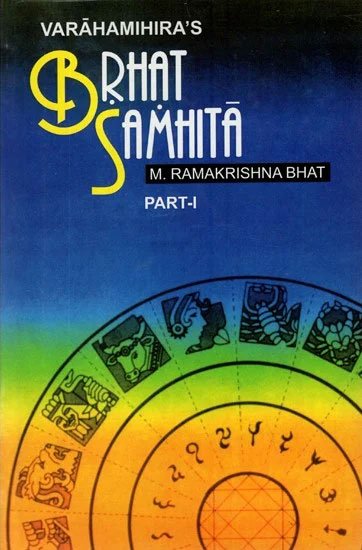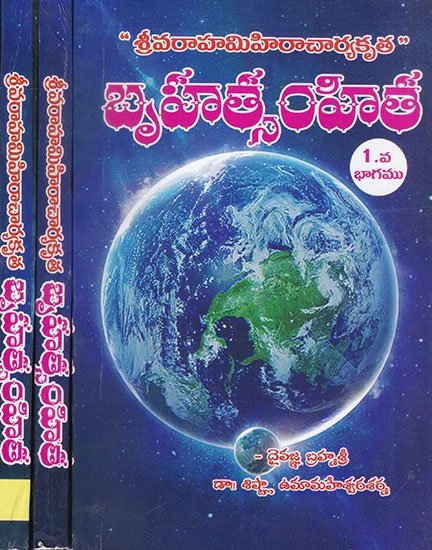Brihat-samhita [sanskrit]
26,560 words
The Sanskrit text of the Brihat-samhita from the 6th-century authored by Varaha Mihira in present-day Ujjain, India. It primarily deals with astrology and astronomy but is presented as an encyclopedia of knowledge.
Verse 10.21
वैदूर्यकान्तिविमलः शुभकृत्प्रजानां बाणातसीकुसुमवर्णनिभश्च शस्तः ।
यं चापि वर्णमुपगच्छति तत्सवर्णान् सूर्यात्मजः क्षयतीति मुनिप्रवादः ॥ २१ ॥
[पञ्चापि]
vaidūryakāntivimalaḥ śubhakṛtprajānāṃ bāṇātasīkusumavarṇanibhaśca śastaḥ |
yaṃ cāpi varṇamupagacchati tatsavarṇān sūryātmajaḥ kṣayatīti munipravādaḥ || 21 ||
[pañcāpi]
The Sanskrit text of Verse 10.21 is contained in the book Brihata Samhita (Sanskrit Text with Hindi Translation) by Pandit Achyutananda Jha. This book is available online or you could buy the latest edition:
Read online Buy now! The Sanskrit text by Pandit Achyutananda Jha (2001)
Glossary of Sanskrit terms
Note: This extracts Sanskrit terms and links to English definitions from the glossary, based on an experimental segmentation of verse (10.21). Some terms could be superfluous while some might not be mentioned. Click on the word to show English definitions.
Vaiduryakanti, Vimala, Shubhakrit, Praja, Prajana, Bana, Asi, Kusuma, Varnanibha, Shasta, Shastri, Yah, Capin, Capi, Varna, Upa, Gacchat, Tat, Tad, Savarna, Suryatmaja, Kshayat, Iti, Muni, Pravada,
Analysis of Sanskrit grammar
Note: this is an experimental feature and only shows the first possible analysis of the Sanskrit text (Verse 10.21). If the system was successful in segmenting the sentence, you will see of which words it is made up of, generally consisting of Nouns, Pronouns, Verbs, Participles and Indeclinables. Click on the link to show all possible derivations of the word.
- Line 1: “vaidūryakāntivimalaḥ śubhakṛtprajānāṃ bāṇātasīkusumavarṇanibhaśca śastaḥ ”
- vaidūryakānti -
-
vaidūryakānti (noun, masculine)[compound], [adverb]vaidūryakānti (noun, feminine)[compound], [adverb]vaidūryakānti (noun, neuter)[compound], [adverb], [nominative single], [vocative single], [accusative single]
- vimalaḥ -
-
vimala (noun, masculine)[nominative single]
- śubhakṛt -
-
śubhakṛt (noun, masculine)[compound], [adverb], [nominative single], [vocative single]śubhakṛt (noun, neuter)[compound], [adverb], [nominative single], [vocative single], [accusative single]
- prajānām -
-
praja (noun, masculine)[genitive plural]praja (noun, neuter)[genitive plural]prajā (noun, feminine)[genitive plural]prajānā (noun, feminine)[accusative single]
- bāṇāt -
-
bāṇa (noun, masculine)[adverb], [ablative single]bāṇa (noun, neuter)[adverb], [ablative single]
- asī -
-
asī (noun, feminine)[compound], [nominative single]asi (noun, feminine)[nominative dual], [vocative dual], [accusative dual]asi (noun, masculine)[nominative dual], [vocative dual], [accusative dual]
- kusuma -
-
kusuma (noun, masculine)[compound], [vocative single]kusuma (noun, neuter)[compound], [vocative single]
- varṇanibhaś -
-
varṇanibha (noun, masculine)[nominative single]
- ca -
-
ca (indeclinable conjunction)[indeclinable conjunction]ca (noun, masculine)[compound], [vocative single]ca (noun, neuter)[compound], [vocative single]
- śastaḥ -
-
śasta (noun, masculine)[nominative single]śastṛ (noun, masculine)[vocative single]√śaṃs -> śasta (participle, masculine)[nominative single from √śaṃs class 1 verb]√śas -> śasta (participle, masculine)[nominative single from √śas class 1 verb]
- Line 2: “yaṃ cāpi varṇamupagacchati tatsavarṇān sūryātmajaḥ kṣayatīti munipravādaḥ || 21 |”
- yam -
-
ya (noun, masculine)[accusative single]yaḥ (pronoun, masculine)[accusative single]
- cāpi -
-
cāpin (noun, masculine)[compound], [adverb]cāpin (noun, neuter)[compound], [adverb], [nominative single], [vocative single], [accusative single]cāpī (noun, masculine)[compound], [adverb]cāpī (noun, feminine)[compound], [adverb], [vocative single]cāpī (noun, neuter)[compound], [adverb], [nominative single], [vocative single], [accusative single]cāpi (noun, masculine)[compound], [adverb]cāpi (noun, feminine)[compound], [adverb]cāpi (noun, neuter)[compound], [adverb], [nominative single], [vocative single], [accusative single]
- varṇam -
-
varṇa (noun, masculine)[adverb], [accusative single]varṇa (noun, neuter)[adverb], [nominative single], [accusative single]varṇā (noun, feminine)[adverb]varṇan (noun, masculine)[adverb]varṇan (noun, neuter)[adverb]
- upa -
-
upa (indeclinable adverb)[indeclinable adverb]upa (indeclinable preposition)[indeclinable preposition]upa (indeclinable)[indeclinable]upa (Preverb)[Preverb]
- gacchati -
-
gacchat (noun, masculine)[locative single]gacchat (noun, neuter)[locative single]√gam (verb class 1)[present active third single]
- tat -
-
tat (indeclinable correlative)[indeclinable correlative]tad (noun, neuter)[compound], [nominative single], [accusative single]
- savarṇān -
-
savarṇa (noun, masculine)[accusative plural]
- sūryātmajaḥ -
-
sūryātmaja (noun, masculine)[nominative single]
- kṣayatī -
-
√kṣi -> kṣayat (participle, masculine)[locative single from √kṣi class 1 verb]√kṣi -> kṣayat (participle, neuter)[nominative dual from √kṣi class 1 verb], [vocative dual from √kṣi class 1 verb], [accusative dual from √kṣi class 1 verb], [locative single from √kṣi class 1 verb]√kṣī -> kṣayat (participle, masculine)[locative single from √kṣī class 1 verb]√kṣī -> kṣayat (participle, neuter)[nominative dual from √kṣī class 1 verb], [vocative dual from √kṣī class 1 verb], [accusative dual from √kṣī class 1 verb], [locative single from √kṣī class 1 verb]√kṣi (verb class 1)[present active third single]√kṣī (verb class 1)[present active third single]
- iti -
-
iti (indeclinable particle)[indeclinable particle]iti (noun, feminine)[compound], [adverb]
- muni -
-
muni (noun, masculine)[compound], [adverb]muni (noun, neuter)[compound], [adverb], [nominative single], [vocative single], [accusative single]munī (noun, feminine)[adverb], [vocative single]mū (noun, neuter)[locative single]
- pravādaḥ -
-
pravāda (noun, masculine)[nominative single]
- Cannot analyse 21
Other editions:
Also see the following editions of the Sanskrit text or (alternative) English translations of the Verse 10.21
Brhatsamhita with the Commentary of Bhattotpala
by Krishna Chandra Dwivedi (2016)
Publisher: Sampurnanand Sanskrit University; 1229 pages;
Buy now!
Brihat Samhita with the Commentary of Utpalapatimala of Yogisvara
by K. V. Sharma (2012)
Publisher: Rashtriya Sanskrit Sansthan, Janakpuri; 754 pages; ISBN-10; 8186111360; ISBN-13: 9788186111369
Buy now!
Brihat Samhita (Hindi Translation)
by K. V. Sharma (2002)
Publisher: Sampurnanand Sanskrit University; 2359 pages; ISBN-13: 9789387890008.
Buy now!
Brhat Samhita (English translation)
by N. Chidambaram Iyer (2022)
Publisher: Parimal Publication Pvt. Ltd.; 801 pages; Edited by Dr. Shrikrishna Jugnu; ISBN-10: 8171104215; ISBN-13: 9788171104215.
Buy now!
Brhat Samhita (English with notes)
by M. Ramakrishna Bhat (2010)
Publisher: Motilal Banarsidas Publishers Pvt. Ltd.; 1155 pages; ISBN-10: 8120810600; ISBN-13: 9788120810600.
Buy now!
Brhat Samhita (Telugu translation)
by Sishtla Umamaheswara Sharma (2020)
Publisher: Mohan Publications, Andhra Pradesh; 846 pages.
Buy now!Preview of verse 10.21 in Kannada sript:
ವೈದೂರ್ಯಕಾನ್ತಿವಿಮಲಃ ಶುಭಕೃತ್ಪ್ರಜಾನಾಂ ಬಾಣಾತಸೀಕುಸುಮವರ್ಣನಿಭಶ್ಚ ಶಸ್ತಃ ।
ಯಂ ಚಾಪಿ ವರ್ಣಮುಪಗಚ್ಛತಿ ತತ್ಸವರ್ಣಾನ್ ಸೂರ್ಯಾತ್ಮಜಃ ಕ್ಷಯತೀತಿ ಮುನಿಪ್ರವಾದಃ ॥ ೨೧ ॥
[ಪಞ್ಚಾಪಿ]
Brhat Samhita (Gujarati translation)
by - (2000)
Publisher: Shree Harihar Pustakalay, Surat; Author: Shri Varahamihira Acharya (શ્રી વરાહમિહીરાચાર્ય); 432 pages.
Buy now!Preview of verse 10.21 in Gujarati sript:
વૈદૂર્યકાન્તિવિમલઃ શુભકૃત્પ્રજાનાં બાણાતસીકુસુમવર્ણનિભશ્ચ શસ્તઃ ।
યં ચાપિ વર્ણમુપગચ્છતિ તત્સવર્ણાન્ સૂર્યાત્મજઃ ક્ષયતીતિ મુનિપ્રવાદઃ ॥ ૨૧ ॥
[પઞ્ચાપિ]
Brhat Samhita (Kannada translation)
by Sripada Raghunatha Kulkarni (2021)
Publisher: Srinidhi Publications, Bangalore; 668 pages with illustrations.
Buy now!Preview of verse 10.21 in Kannada sript:
ವೈದೂರ್ಯಕಾನ್ತಿವಿಮಲಃ ಶುಭಕೃತ್ಪ್ರಜಾನಾಂ ಬಾಣಾತಸೀಕುಸುಮವರ್ಣನಿಭಶ್ಚ ಶಸ್ತಃ ।
ಯಂ ಚಾಪಿ ವರ್ಣಮುಪಗಚ್ಛತಿ ತತ್ಸವರ್ಣಾನ್ ಸೂರ್ಯಾತ್ಮಜಃ ಕ್ಷಯತೀತಿ ಮುನಿಪ್ರವಾದಃ ॥ ೨೧ ॥
[ಪಞ್ಚಾಪಿ]
![Brihat-samhita [sanskrit] - book cover](/uploads/a/Brihat-Samhita-Sanskrit.jpg)
